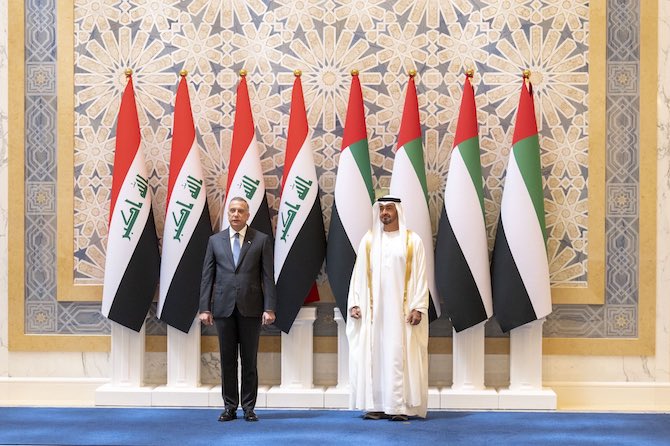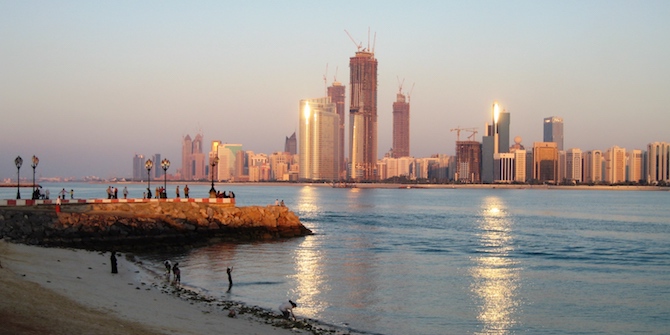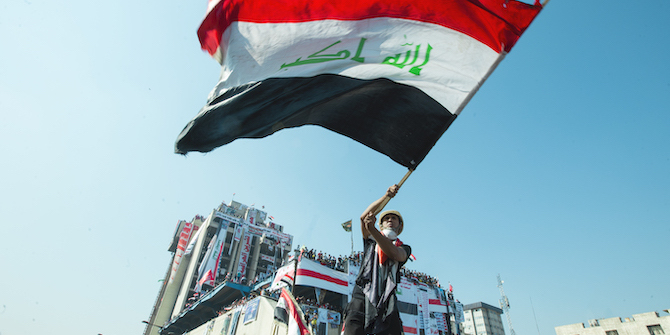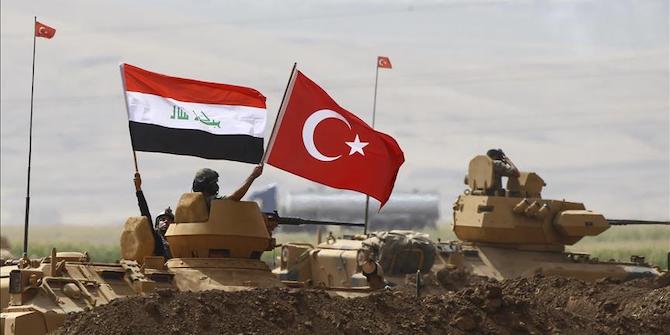by Mehmet Alaca and Hamdullah Baycar

Iraqi Prime Minister Mustafa al-Kadhimi meets Mohamed bin Zayed, Crown Prince of Abu Dhabi, on his recent visit to the country in April 2021. Source: Mohamed bin Zayed, Twitter
The relationship between Iraq and its Gulf Cooperation Council (GCC) neighbours has always been volatile. Kuwait’s invasion in 1990, the US invasion of Iraq in 2003, the rise of Nouri al-Maliki’s government and the emergence of ISIS were some developments that greatly impacted this relationship as they accelerated sectarian division and regional instability. Though muted in its overall response, GCC states supported the US invasion of Iraq in the hope of having a non-hostile neighbour who under Saddam had always threatened and intimidated them. However, the strengthened relations between Iraq and Iran in the post-US invasion period – Hashd al-Sha’abi or Popular Mobilisation Forces (PMF) that form mainly pro-Iran armed groups consolidated Iran’s influence over the Iraqi security system and the significant gains that the Iran-backed Fatah coalition made in Iraq’s parliament in the 2018 elections – did little to heal the rift with its neighbours in the Gulf.
In recent years, however, GCC states have been keen to build good relations with Iraq, especially in light of the current Premier Mustafa al-Kadhimi’s visit to the United Arab Emirates (UAE) on 4 April, shortly after his first official trip to Saudi Arabia on 31 March. During his visit, the two countries that already have many investments in Iraq have promised more cooperation. Kadhimi secured two separate investments each worth $3 billion from the UAE and Saudi Arabia respectively.
The fact that Kadhimi has publicly pledged to curb Iranian influence in Iraq has boosted his popularity with Gulf states. Saudi Arabia, the UAE and Bahrain are on the opposite side to Iran in many of the ongoing regional conflicts such as the one in Yemen. GCC states consider economic investment to be one of the most effective tools to wrestle Iraq away from Iran’s influence. Combatting Iranian influence in Iraq can be considered as one of the major drivers behind GCC states’ attempted involvement in the affairs of its Arab neighbour.
Competition Between GCC States
Former Iraqi Prime Minister Haider al-Abadi’s desire to improve relations with the Arab world was met positively in the region. In this context, Riyadh appointed an ambassador to Baghdad in 2015 and opened its first consulate in Erbil the following year. Furthermore, Saudi Arabia’s then Crown Prince, Mohammed bin Naif, met with Abadi and promised multifaceted cooperation in 2017. The relations seem to be becoming more cordial with the arrival of new Iraqi Premier Kadhimi. Kadhimi, for example, intended to make his first foreign visit to Saudi Arabia but the visit was postponed due to the sudden illness of King Salman. The reopening of the Arar border between Saudi Arabia and Iraq on 20 November 2020 after three decades of closure is another sign of the beginning of warm relations between Iraq and Saudi Arabia.
The UAE, like Saudi Arabia, was dissatisfied with visible Iranian influence in Iraq. However, the UAE began to reach out to Iraq in 2008 by restoring diplomatic relations and increasing its economic engagement. Prominent Iraqi Shia cleric Moqtada al-Sadr secured the backing of Abu Dhabi and Riyadh in his intention to bring Iraq back into the Arab fold. Al-Sadr, dissatisfied with Iranian influence in the country, supports Kadhimi’s efforts to build relations with the neighbouring Arab countries the UAE, Saudi Arabia and other Gulf states. Qatar, like the UAE, strengthened relations both with Baghdad and Erbil and even negotiated for the free trade agreement. The Gulf country, which also wants to improve its ties with the Kurdistan Region of Iraq (KRI), announced that it would open a new consulate in Erbil.
Despite its painful memories from the 1990 invasion, Kuwait plays the mediator and facilitator role between the GCC and Iraq for security and economic reasons. In 2018, for example, Kuwait hosted the Iraq Reconstruction Conference in which participants pledged $30 billion in loans or investment. After Turkey’s $5 billion and the US’s $3 billion, Kuwait had a significant share with around $2 billion and there was $5-8 billion in total from all GCC states. Also, besides sharing a border, a third of Kuwait’s population is Shia and hence it closely follows the sectarian tensions in Iraq.
Iraq as a Bridge Between the GCC and Iran
The economic investment strategy is an intrinsic aspect of the GCC’s foreign policy. Investing in other countries has different motivations for these states, including but not limited to security buying, increasing influence, market diversification and further economic gains. Moreover, by investing in Iraq, the GCC monarchs give the impression of ‘Arab solidarity’ to their own population.
The UAE, since the American invasion, increased its investment and loans to the country; Crescent Petroleum (an Emirati company), for example, invested more than $3 billion in Iraq and signed a gas sale agreement with KRI, which can be considered a significant boost to bilateral relations. The UAE also undertook restoration of some historical places destroyed during the conflicts to increase its popularity among Sunni society and prevent further Iranian influence. In the international conference held in Kuwait (the Kuwait International Conference for Reconstruction of Iraq), the UAE pledged $500 million to Iraq. In addition, the UAE’s then Minister of State Anwar Gargash announced that the UAE would invest $5.5 billion in the private sector for the Al Rasheed base and Umm Qasr port, another example of the UAE’s deep interest in Iraq. The UAE, like in its relationship with Iran, continued its economic relations with Iraq. From 2003 to 2009, for example, UAE companies invested around $31 billion, consisting of half of the total investment in the country over the same period.
Caught between a tinkering economy and Iran-backed militias on a rampage in the country, Iraq now more than ever seeks to balance Iranian influence by improving its foreign relations with its allies in the Gulf. In this context, it can also be seen that Kadhimi attempts to strike a similar balance in his domestic affairs, such as his focus on equal appointments (of Sunni and Shia) to the security bureaucracy and dialogue initiative with the Kurds.
Considering all of these factors, Iraq can also play a significant role in bringing Iran, Saudi Arabia (or broadly GCC states) and the US to the negotiating table. Such a role is risky but can bring benefits to all parties. Incidentally, Saudi Arabia and Iran held a secret meeting, wherein the Iraqi Prime Minister Kadhimi acted as a ‘bridge’ between the two geopolitical rivals. In this sense, Gulf countries’ public diplomacy activities and financial investments are complementary factors that can ease the tension. However, it should also be remembered that Iraq’s role in GCC-Iran reconciliation is relatively weak. Therefore, the expectation of Iraq being at the cooperation table may not come to pass.






